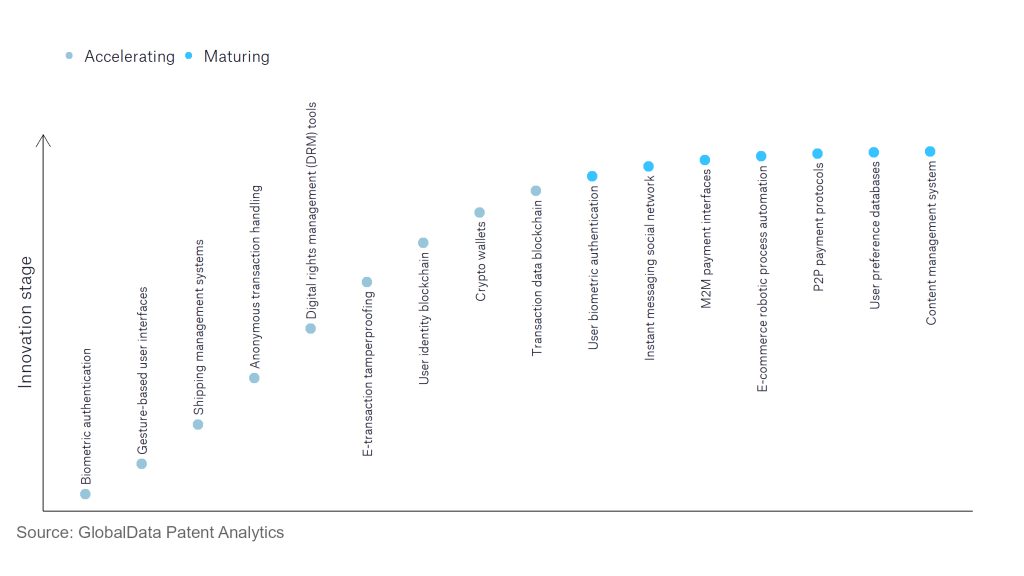Who are the leading innovators in retail crypto wallets?
The retail industry continues to be a hotbed of innovation, with activity driven by myriad factors, including regulatory reform and the growing importance of technologies such as crypto wallets, anonymous transaction management and digital rights management (DRM) tools. In the past three years alone, there have been over 133,000 patents filed and granted in the retail sector, according to GlobalData’s report on Cloud: Crypto Wallets.
However, not all innovations are equal, nor do they follow a constantly upward trend. Instead, their development takes the form of an S-shaped curve that reflects their typical life cycle from early emergence to accelerating adoption, before finally stabilizing and reaching maturity.
Identifying where a particular innovation is on this journey, especially those in emerging and accelerating stages, is critical to understanding their current level of adoption and the likely future trajectory and impact they will have.
70+ innovations will shape retail
According to GlobalData’s Technology Foresights, which plots the retail S-curve using innovation intensity models built on over 128,000 patents, there are 70+ areas of innovation that will shape the future of the industry.
Biometric authentication, gesture-based user interfaces and freight management systems are some of these accelerating innovation areas, where adoption has been steadily increasing. Among matures areas of innovation are user biometric authentication and social networks for instant messaging, which are now well established in the industry.
Innovation S-curve for cloud in retail

Crypto wallets is a central area of innovation within the cloud
A crypto wallet refers to a program, device, physical medium or service that stores public and/or private keys for cryptocurrency transactions. In addition, a crypto wallet also offers the functionality to encrypt and/or sign information. Unlike a traditional wallet that contains cash, crypto wallets do not store cryptocurrency. A customer’s digital assets live on the blockchain and can only be accessed with a private key.
GlobalData’s analysis also uncovers the companies at the forefront of each area of innovation and assesses the potential reach and impact of their patenting activity across different applications and geographies. According to GlobalData, there are 100+ companies, spanning technology providers, established retail companies, and up-and-coming startups that are engaged in the development and use of crypto wallets.
Key players in crypto wallets – a disruptive innovation in retail
“Application diversity” measures the number of different applications identified for each relevant patent, dividing companies into either “niche” or “diversified” innovators.
“Geographical scope” refers to the number of different countries each relevant patent is registered in, and reflects the breadth of geographic application intended, from “global” to “local.”
Leading patent applicants in the crypto wallet space are SoftBank Group, nChain Holdings, Headwater Research, Headwater Partners, Visa and Capital One Financial. Visa has used blockchain technology to create an international digital identity system called Visa B2B Connect. This system tokenizes business data such as account details and bank details and gives them a cryptographic key identifier.
In terms of application diversity, Technikka Conexion, Adidas, Cox Enterprises and AT&T are the leading players.
In terms of geographic reach, Headwater Partners, Authenify, Early Warning Services and Intertrust Technologies are the top players.
Customers are likely to increasingly turn to crypto wallets for transactions as crypto wallets provide various benefits such as simplicity and ease of use, transaction and account confidentiality, convenient portfolio management and access to various currencies.
To further understand the key themes and technologies disrupting retail, access GlobalData’s latest thematic research report on Cloud Computing in Retail.


